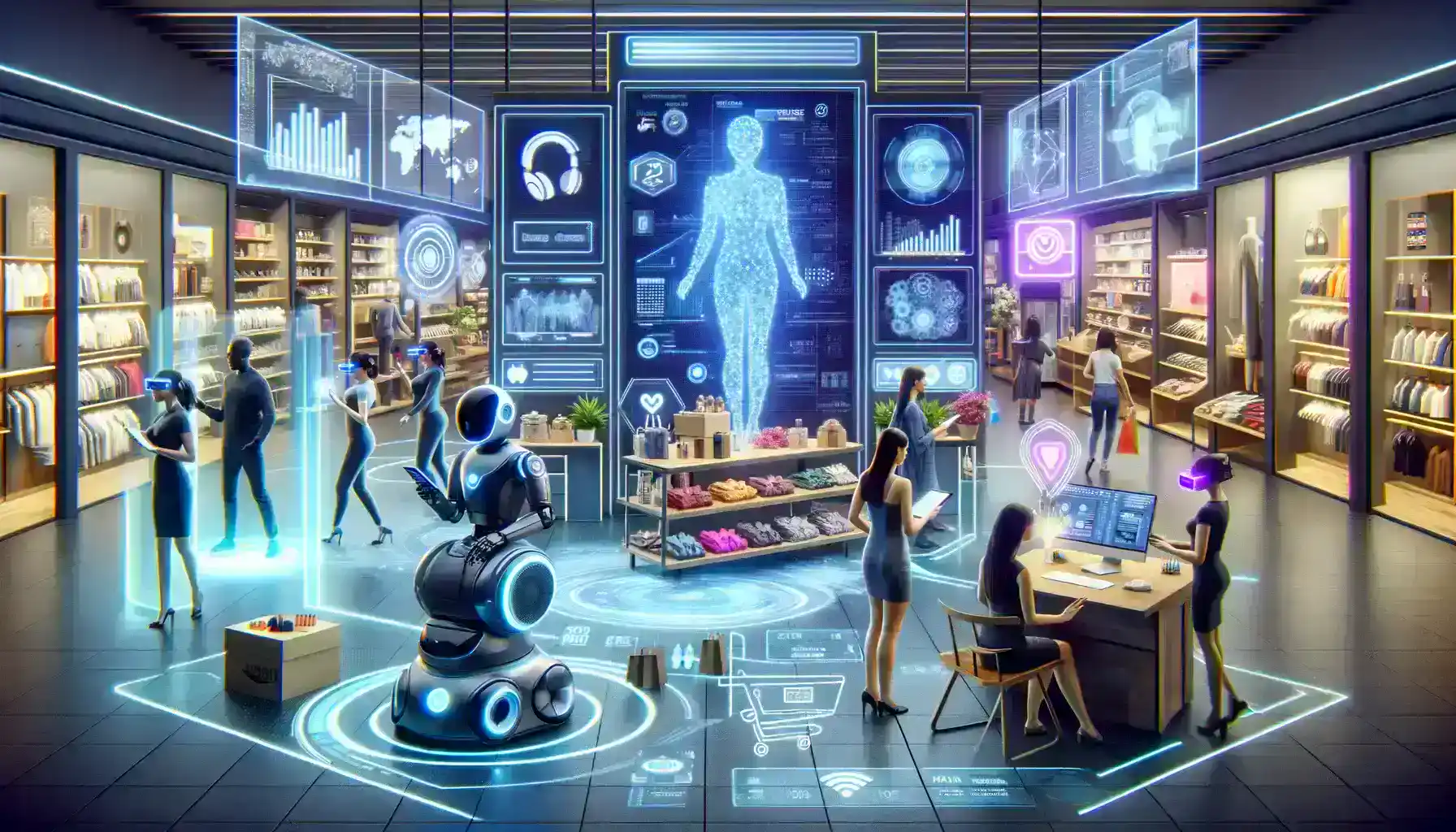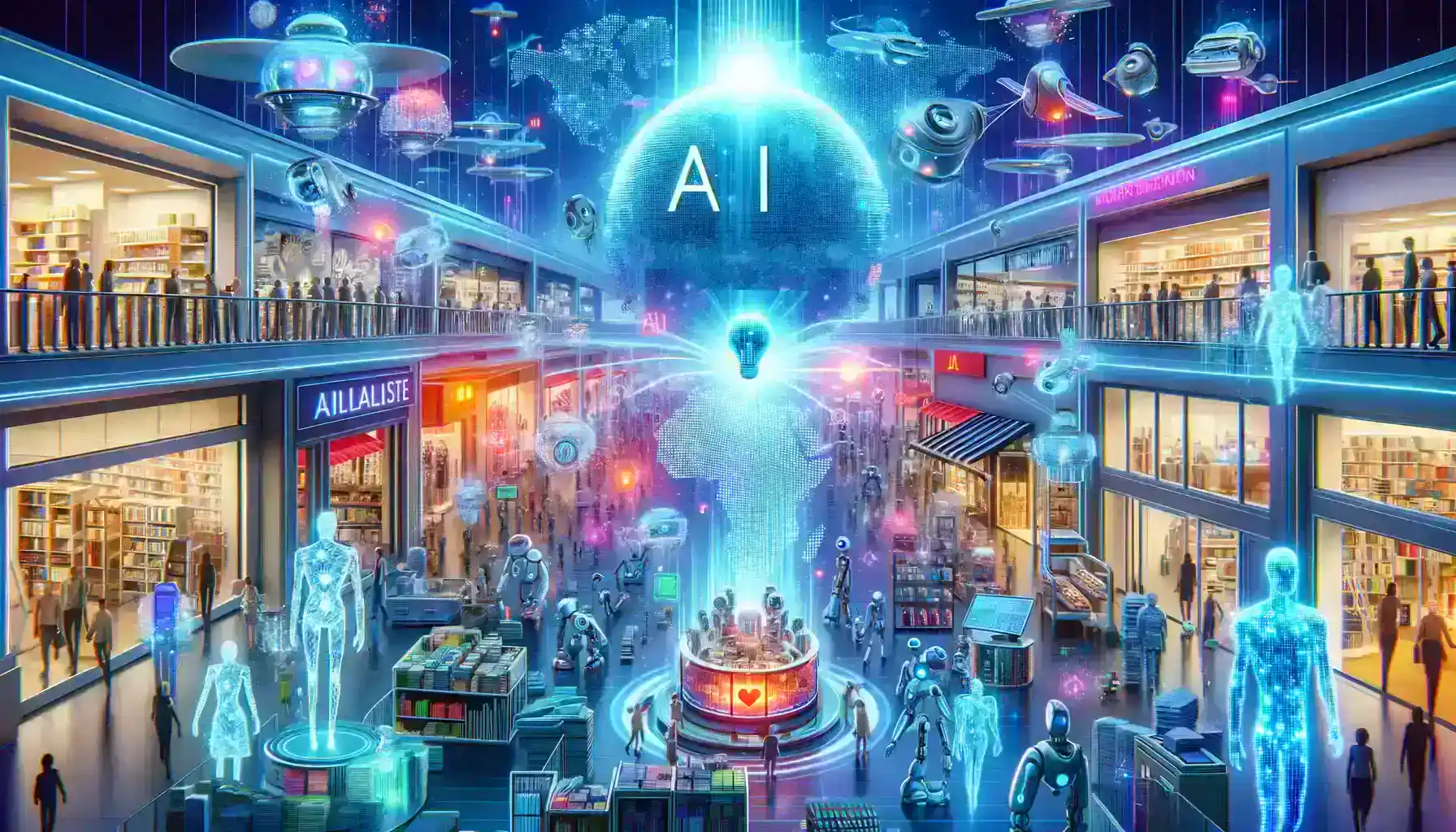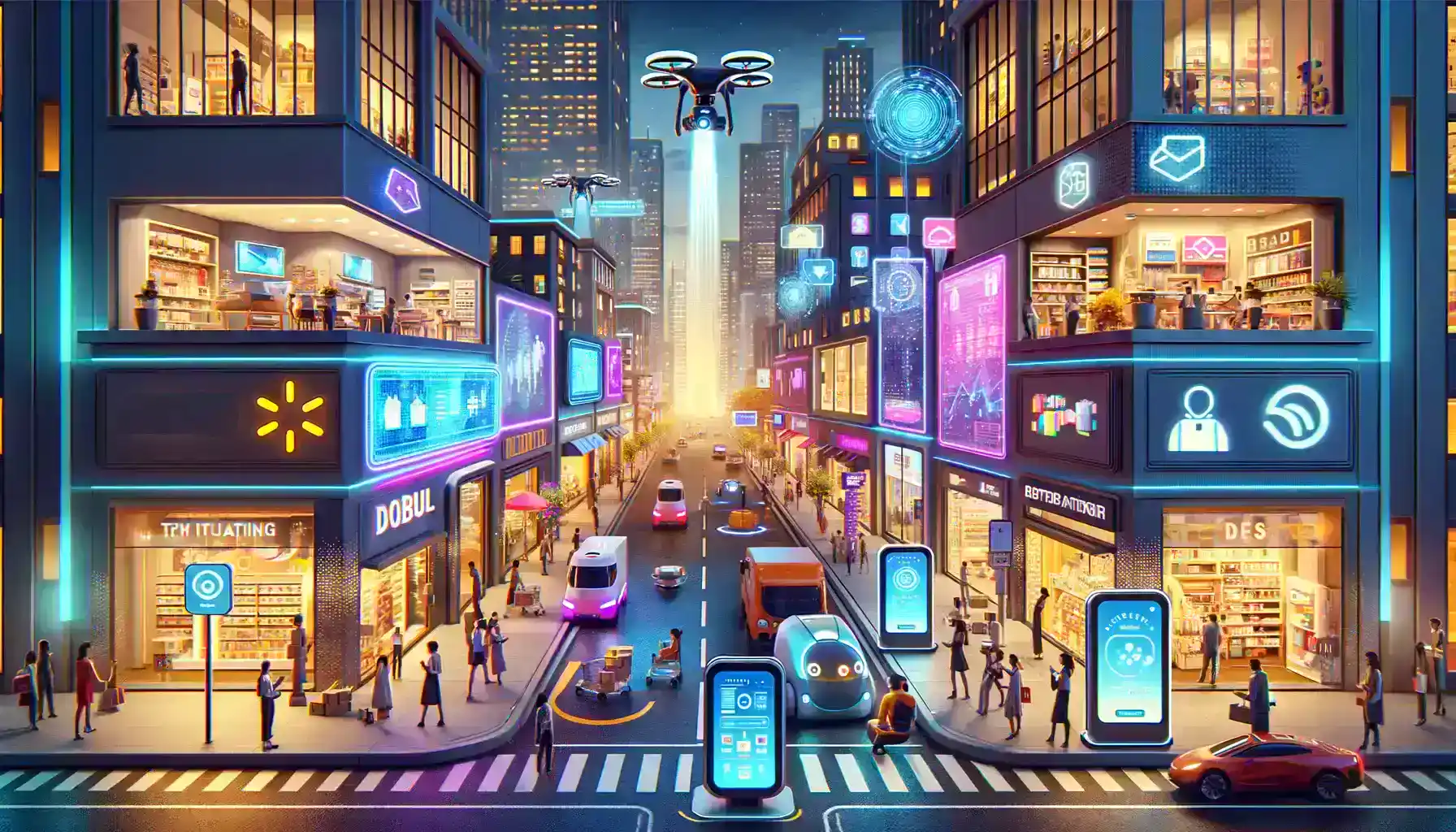Table of Contents
The retail industry is experiencing a seismic shift, and at the heart of this transformation is the integration of Artificial Intelligence (AI). In this article, we embark on a journey to uncover the remarkable surge in the valuation of AI within the retail sector, with a keen focus on the projected $41 billion industry valuation by the year 2030—an exceptional milestone encapsulated by the crucial keyword, “AI Retail Valuation 2030.

1. The Ascendance of AI in Retail
The ascendance of AI in retail is a testament to the industry’s adaptability and the recognition of AI’s capacity to reshape the retail landscape fundamentally. This transformation is not confined to a specific niche within the sector but extends across a wide spectrum of retail operations and customer touchpoints. From optimizing supply chain logistics to enhancing the in-store shopping experience, AI’s influence is pervasive and transformative.
A Retail Revolution Unleashed
AI redefines the retail landscape, reshaping how businesses operate and customers shop. To grasp the significance of AI in retail, we must first comprehend its essence. At its core, AI in retail encompasses the utilization of advanced algorithms, machine learning, and data analytics to optimize various facets of retail operations. These include inventory management, customer engagement, demand forecasting, and invariant personalized marketing.
The term “AI Retail Valuation 2030” signifies the estimated worth of the AI-driven retail market by 2030. It represents the staggering growth and the boundless potential that AI technology holds within the retail industry.
Realistic-globe Transformations
To truly appreciate the impact of AI in retail, we need to delve into real-world examples that vividly illustrate its profound influence on the industry. Let’s explore some of these tangible transformations.
Elevated Customer Experiences
AI is revolutionizing how customers experience retail. Consider the rise of virtual shopping assistants powered by AI. These digital aides can assist customers in finding products, providing recommendations, and even answering queries, thereby enhancing overall customer satisfaction.
Sephora, a leading cosmetics retailer, Sephora is a prime illustration of AI’s transformative role in enhancing customer experiences. Sephora’s chatbots, powered by AI, serve as digital beauty advisors. They don’t just assist customers in locating products; they go a step further by offering personalized product recommendations and makeup tips.
By harnessing AI’s capabilities, Sephora has created a more engaging and interactive shopping experience for its customers, where beauty enthusiasts receive tailored guidance and advice. This not only fosters customer loyalty but also elevates the overall shopping journey, all contributing to the ascent of AI Retail Valuation 2030.
Inventory Optimization
Efficient inventory management is paramount for retailers, and AI algorithms are proving to be invaluable in this regard. By analyzing historical data, current trends, and even external factors such as weather, AI can accurately predict demand. This leads to reduced overstocking, minimized wastage, and enhanced profitability.
Walmart harnesses AI-driven demand forecasting to optimize inventory management, resulting in substantial cost savings and improved supply chain efficiency.
Personalized Marketing
AI empowers retailers to deliver highly personalized marketing campaigns tailored to individual preferences and behaviors. This level of customization not only increases customer engagement but also drives higher conversion rates.
As we navigate the path toward AI Retail Valuation 2030, personalized marketing emerges as a cornerstone of the retail industry’s transformation. AI’s ability to create highly relevant and individualized marketing experiences not only propels businesses forward but also sets a new standard for customer engagement. In this era of AI-driven personalized marketing, customers are not just shoppers; they are participants in a meticulously tailored retail adventure.
Amazon’s recommendation engine, fueled by AI, suggests products to users based on their browsing and purchase history. This contributes to increased sales and heightened customer satisfaction.
Fraud Detection and Prevention
In the rapidly evolving landscape of AI Retail Valuation 2030, one crucial aspect is fraud detection and prevention. In the era of online shopping, fraud poses a significant challenge for retailers. AI-powered fraud detection systems can analyze transaction data in real time and identify suspicious activities, thereby mitigating financial losses.
Shopify employs AI algorithms to detect fraudulent orders, safeguarding both merchants and customers from potential fraud.
AI Retail Valuation 2030: Revolutionizing Supply Chain Optimization
In the rapidly evolving landscape of retail, artificial intelligence (AI) is emerging as a game-changer, and its impact on the industry’s valuation by 2030 is profound. One of the key areas where AI is making a significant difference is in the optimization of supply chain operations.
It can track shipments, predict delivery times, and even optimize routes for maximum efficiency. AI will empower retailers to hyper-personalize every facet of the shopping journey. From product recommendations to in-store experiences, customers can anticipate a level of personalization that was once inconceivable.
Logistics Robotic assistance in retail logistics represents a transformative and innovative approach to optimizing various aspects of the supply chain within the retail industry. It involves the integration of robotics and automation technologies to streamline and enhance the efficiency of tasks related to the movement, storage, and delivery of goods in retail operations.
Coca-Cola utilizes AI to streamline its supply chain, ensuring that products are delivered efficiently to retailers while minimizing costs.
2. The Trajectory of Retail AI Growth

Market Accumulation and Projections
The retail industry stands poised to reap substantial benefits from AI, with the market projected to reach a valuation of $41 billion by 2030. This growth is propelled by burgeoning AI adoption rates and the realization of its multifaceted benefits.
AI Retail Valuation 2030: Rapid AI Adoption Rates
The pace at which retailers are embracing AI technologies is nothing short of remarkable. The COVID-19 pandemic acted as a catalyst for the digital transformation in the retail sector, making AI adoption a top priority for numerous businesses.
Macy’s, a prominent department store chain, significantly increased its investment in AI-driven technology during the pandemic to enhance online shopping experiences, resulting in heightened customer satisfaction and increased online sales.
As we look ahead to 2030, the implications of such rapid AI adoption are profound. It not only transforms the way retailers operate but also has a significant impact on the valuation of the entire retail industry. The vision for AI retail valuation 2030 is one where AI-driven innovations have not only become commonplace but have also contributed substantially to the industry’s projected value of $41 billion.
AI Retail Valuation 2030: Customer Data as a Catalyst for Retail Industry Growth
Artificial Intelligence (AI) plays a pivotal role in this data-driven transformation, promising significant growth in the retail sector by 2030. Retailers that wholeheartedly embrace AI gain a significant competitive edge. The ability to offer personalized experiences, optimize operations, and swiftly adapt to changing market conditions positions them for sustained success.
Starbucks leverages AI to analyze customer purchase data and personalize its loyalty program. This initiative has led to increased customer loyalty and heightened sales for the global coffee giant.
Nike’s AI-driven Nike Fit app assists customers in finding their perfect shoe size, enhancing customer satisfaction and reducing returns.
3. The Future of AI in Retail

The future of AI in the retail industry holds immense promise, driven by the goal of achieving AI Retail Valuation in 2030. However, it also presents a set of unique challenges that must be addressed to unlock its full potential. These challenges include concerns related to data privacy, the need for skilled AI professionals, and the cost of implementing AI solutions.
A Futuristic Retail Store Interior with AI Elements envisions a cutting-edge shopping environment where artificial intelligence (AI) plays a central role in enhancing the customer experience and optimizing retail operations. This concept combines innovative design and advanced technology to create a retail space that is both visually captivating and highly efficient.
Challenges and Opportunities for AI Retail Valuation 2030
The future of AI in retail holds tremendous promise, but it also presents a set of unique challenges. These include concerns related to data privacy, the need for skilled AI professionals, and the cost of implementing AI solutions. Nonetheless, the opportunities vastly outweigh these challenges.
Hyper-Personalization: AI will empower retailers to hyper-personalize every aspect of the shopping journey. From highly accurate product recommendations to tailored in-store experiences, customers can anticipate a level of personalization that was once inconceivable. This level of personalization is a key driver of AI Retail Valuation 2030.
Bearable Practices: AI can play a pivotal role in making retail operations more sustainable. By optimizing supply chains, reducing waste, and enabling energy-efficient practices, retailers can contribute significantly to a greener future. Sustainability is not only an ethical imperative but also a potential boost to AI Retail Valuation 2030.
Smarter Physical Stores: Even brick-and-mortar stores will undergo a significant transformation with AI. Smart shelves that automatically restock products, automated checkout processes that enhance efficiency, and personalized in-store navigation using AI-powered apps are just a few examples of innovations on the horizon. These advancements are poised to redefine the retail landscape, driving AI Retail Valuation 2030.
Conclusion
The surge in “AI retail valuation 2030” marks a significant turning point for the retail industry. The rapid growth and adoption of artificial intelligence are poised to bring about a transformative era in retail. Real-world examples vividly illustrate the tangible impact of AI in reshaping retail operations, enriching customer experiences, and redefining market dynamics.
As we look ahead, the retail landscape will continue to undergo profound changes, with AI leading the charge in innovation. AI is not just a technological trend; it’s a driving force behind growth, enabling retailers to create more personalized, efficient, and sustainable shopping experiences.
Embracing AI is not an option; it’s imperative for retailers who aspire to thrive in the ever-evolving realm of commerce. The future of retail has undeniably arrived, and it’s unequivocally powered by AI. The year 2030 promises to be a remarkable milestone in the journey of AI’s integration into the retail sector, paving the way for a more dynamic and promising industry.